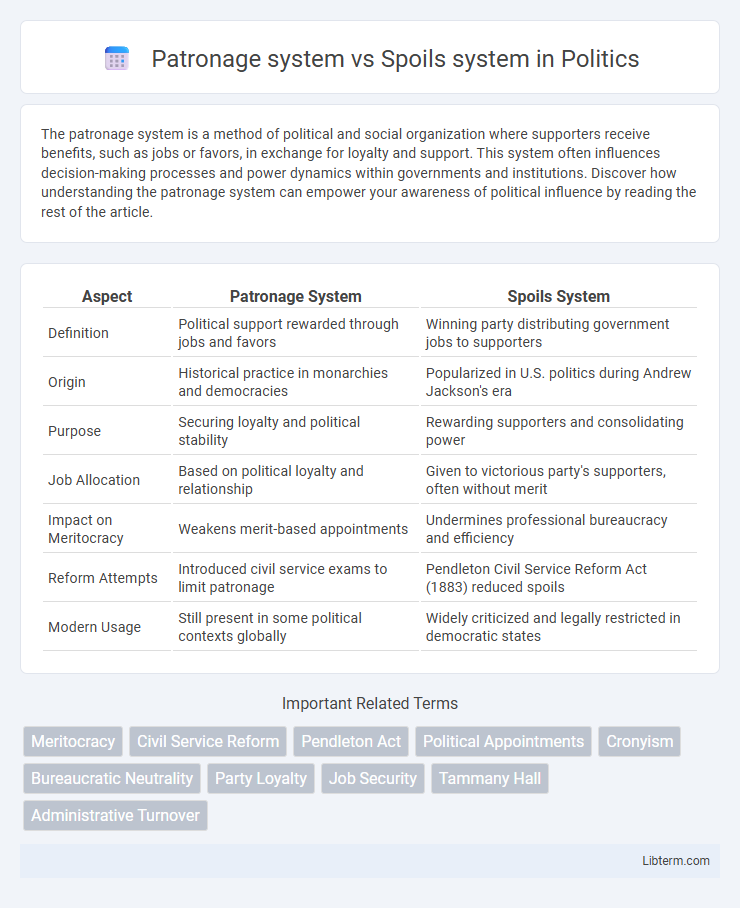The patronage system is a method of political and social organization where supporters receive benefits, such as jobs or favors, in exchange for loyalty and support. This system often influences decision-making processes and power dynamics within governments and institutions. Discover how understanding the patronage system can empower your awareness of political influence by reading the rest of the article.
Table of Comparison
| Aspect | Patronage System | Spoils System |
|---|---|---|
| Definition | Political support rewarded through jobs and favors | Winning party distributing government jobs to supporters |
| Origin | Historical practice in monarchies and democracies | Popularized in U.S. politics during Andrew Jackson's era |
| Purpose | Securing loyalty and political stability | Rewarding supporters and consolidating power |
| Job Allocation | Based on political loyalty and relationship | Given to victorious party's supporters, often without merit |
| Impact on Meritocracy | Weakens merit-based appointments | Undermines professional bureaucracy and efficiency |
| Reform Attempts | Introduced civil service exams to limit patronage | Pendleton Civil Service Reform Act (1883) reduced spoils |
| Modern Usage | Still present in some political contexts globally | Widely criticized and legally restricted in democratic states |
Introduction to Patronage and Spoils Systems
The Patronage system involves awarding government jobs and favors based on loyalty and support, often used to maintain political alliances. The Spoils system refers specifically to the practice of distributing public offices to political supporters after winning an election, prioritizing party loyalty over merit. Both systems played significant roles in shaping American political appointments during the 19th century, influencing the development of civil service reforms.
Historical Background of Political Appointments
The Patronage system, rooted in ancient political traditions, involves granting public offices to supporters and allies as a reward for loyalty, prominently evident in 19th-century American and British politics. The Spoils system, formalized in the United States during Andrew Jackson's presidency in the 1820s and 1830s, systematically replaced government officials with political party loyalists after elections to consolidate power. Both systems shaped the evolution of political appointments, influencing public administration reforms such as the Pendleton Civil Service Act of 1883, which aimed to curb corruption by introducing merit-based hiring.
Defining the Patronage System
The patronage system, also known as the spoils system, is a practice where political leaders grant government jobs and favors to loyal supporters and party members as a reward for their assistance during elections. This system often prioritizes political loyalty over merit and qualifications, leading to a workforce influenced by allegiance rather than expertise. Critics argue that the patronage system can undermine efficiency and encourage corruption within public administration.
Understanding the Spoils System
The Spoils System, rooted in 19th-century American politics, involves awarding government jobs to political supporters and loyalists as a reward for campaign assistance rather than merit. Unlike the Patronage System, which broadly refers to the practice of political appointments, the Spoils System specifically implies a transactional approach that often leads to corruption and inefficiency in public administration. Understanding this system highlights its impact on the development of civil service reforms aimed at promoting merit-based appointments and reducing partisan favoritism.
Key Differences Between Patronage and Spoils Systems
The patronage system involves political appointments based on loyalty and support, often rewarding allies with government positions, while the spoils system explicitly distributes public offices to party supporters after an election victory. Patronage emphasizes long-term alliances and may include merit considerations, whereas the spoils system prioritizes immediate political gain by replacing prior officeholders regardless of qualifications. Both systems influence political power dynamics but differ in their approach to appointments and the extent of meritocracy involved.
Pros and Cons of the Patronage System
The Patronage System enables political leaders to reward loyal supporters with government jobs, fostering strong party loyalty and ensuring aligned policy implementation. However, this system often leads to inefficiency and corruption, as appointments prioritize connections over merit and qualifications. While it strengthens political alliances, it risks undermining public trust and administrative competence due to potential favoritism and lack of accountability.
Advantages and Disadvantages of the Spoils System
The Spoils System promotes loyalty and rapid governmental staffing by rewarding political supporters with public offices, which can enhance party unity and responsiveness. However, it often leads to inefficiency and corruption due to appointing unqualified individuals, undermining merit-based governance and public trust. The system contrasts with the Patronage System by emphasizing political favoritism over competence, resulting in potential instability and decreased administrative effectiveness.
Impact on Government Efficiency and Accountability
The patronage system often undermines government efficiency by appointing officials based on political loyalty rather than merit, leading to unqualified personnel and potential corruption. In contrast, the spoils system, while similar in rewarding supporters, can cause frequent turnover and instability in office, disrupting continuity and administrative competence. Both systems challenge accountability, but merit-based reforms like the merit system have proven more effective in promoting transparent, efficient, and responsible governance.
Reforms and the Civil Service Movement
The Patronage system, characterized by political appointments based on loyalty rather than merit, faced significant reforms during the Civil Service Movement aimed at promoting efficiency and reducing corruption. The Pendleton Civil Service Reform Act of 1883 established competitive exams and merit-based hiring, fundamentally transforming government employment practices. These reforms curtailed the Spoils system's dominance by ensuring civil service positions were awarded based on qualifications, enhancing professionalism in public administration.
Modern Relevance and Future of Political Appointment Systems
The patronage system, rooted in loyalty-based appointments, contrasts with the spoils system's practice of rewarding political supporters with government jobs, both influencing modern governance structures. Contemporary political appointment systems increasingly emphasize meritocracy and transparency to reduce corruption and enhance administrative efficiency. Future reforms are likely to integrate advanced data analytics and AI-driven assessments to ensure competence and accountability in public sector appointments.
Patronage system Infographic

 libterm.com
libterm.com